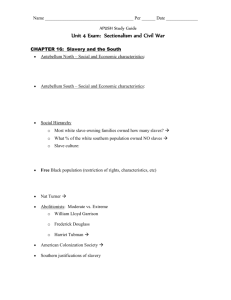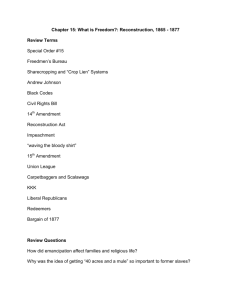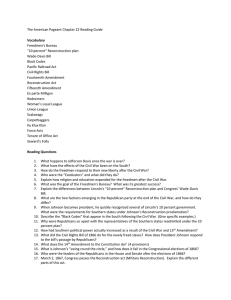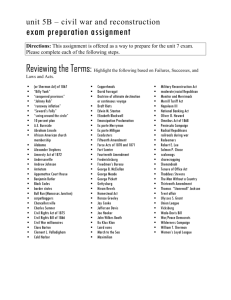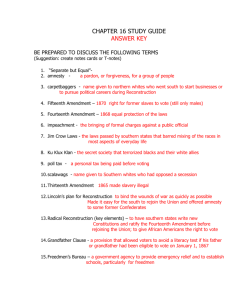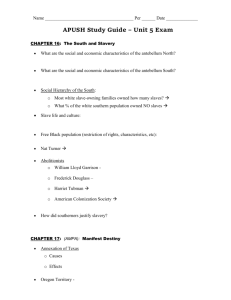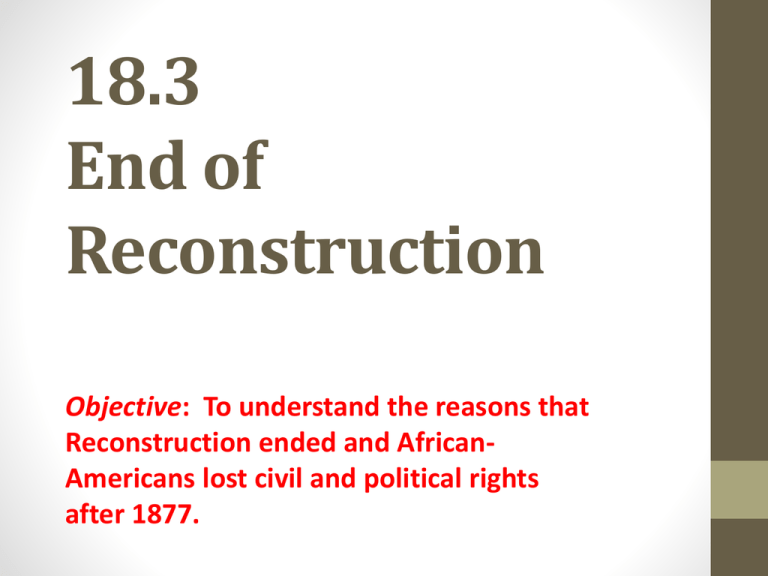
18.3
End of
Reconstruction
Objective: To understand the reasons that
Reconstruction ended and AfricanAmericans lost civil and political rights
after 1877.
I.D. Review
• Radical republicans
• Reconstruction
• Freedmen’s Bureau
• Impeachment
• Andrew Johnson
• Black codes
• Civil Rights
• Richmond
• 13th Amendment
• 14th Amendment
• 15th Amendment
• Freedmen’s
schools
• Sharecropping
• Ku Klux Klan
• Lynch
th
15 Amendment
The right of citizens of the United States to vote shall not be denied or
abridged by the United States or by any state on account of race, color, or
previous condition of servitude.
“Congress passed the Fifteenth Amendment on February 26, 1869. But some
states resisted ratification. …All eyes turned toward those Southern states
which had yet to be readmitted to the Union. Acting quickly, Congress ruled
that in order to be let into the Union, these states had to accept both the
Fifteenth Amendment and the Fourteenth Amendment, which granted
citizenship to all people born in the United States, including former slaves. Left
with no choice, the states ratified the amendments and were restored to
statehood.”
SOURCE: PBS, http://www.pbs.org/wgbh/americanexperience/features/general-article/grant-fifteenth/
WHO DID NOT GET THE RIGHT TO VOTE IN THE 15th AMENDMENT?
Map: PopularVotefor PresidentintheSouth,1872
Grant (Republican)
wins 214 electoral
votes to Seymour’s
(Democrat) 80
NOTE: Grant only
wins popular vote
by 300,000
SIGNIFICANCE:
The approx.
500,000 to 700,000
Freedmen’s votes
swing election
to Grant. This
election reinforced
the resolve of the
KKK and white
supremacists to
prevent freedmen
from voting.
Copyright © Houghton Mifflin Company. All rights reserved.
Grant Administration
• Grant – Popular soldier, ineffective
president
• Grant’s Cabinet and Administration was
infamous for graft, corruption and
nepotism (his wife’s family)
• Despite, numerous scandals and
charges of incompetence, Grant is
reelected in 1872!
• Handles Panic of 1873 poorly
Reconstructioncartoon
Reconstruction
cartoon
This 1868 cartoon by
Thomas Nast
pictured the
combination of
forces that threatened
the success of
Reconstruction:
southern opposition
and the greed,
partisanship, and
racism of northern
interests. (Library of
Congress)
Copyright © Houghton Mifflin Company. All rights reserved.
Pres. Grant fights the Klan
“The Ku Klux Klan Act of 1871, made private criminal acts
federal crimes; consequently, President Grant decreed that
"insurgents were in rebellion against the authority of the
United States." He sent federal troops to restore law and order
to many areas where violence was raging at its worst.
In nine counties of South Carolina, martial law was declared
and Klansmen were tried before predominantly black juries.
By 1872, the Klan as an organization was broken. By the
time the terror ended, thousands of blacks and hundreds of
whites had been massacred or driven from their homes and
communities. For a moment, it seemed that peace and
Republican rule was restored. Yet within a few years, the terror
was reborn and Reconstruction officially ended.”
SOURCE:
PBS. http://www.pbs.org/wnet/jimcrow/stories_events_enforce.html
Copyright © Houghton Mifflin Company. All rights reserved.
The White League
Alabama's White League, formed in 1874, strove to oust Republicans from office by
intimidating black voters. To political cartoonist Thomas Nast, such vigilante tactics
suggested an alliance between the White League and the outlawed Ku Klux Klan.
(Harper's Weekly, October 24, 1874)
Copyright © Houghton Mifflin Company. All rights reserved.
Panic of 1873
CIVIL WAR
PANIC OF 1837
PANIC OF 1873
• What was the significance of the Panic of 1873?
• How did it effect the economy?
• How did it effect the political power of Grant and Republicans?
The Grant
administration had
already undergone
the embarrassment
of a slew of
scandals.
In the fall 1876
elections, the
Democrats attempt
to impeach the
president.
http://www.harpweek.com/09Cartoon
BrowseByDateCartoon.asp?Month=J
une&Date=3
Supreme Court undermines
Black Civil Rights
VOTING RESTRICTIONS & SEGREGATION
• Literacy test
• Poll tax
• Grandfather clause
• Jim Crow Laws
In 1876, the Supreme Court finds these laws
constitutional in U.S. v. Cruikshank and U.S. v. Reese.
WHY???
Map: ThePresidentialElectionof 1876andtheCompromiseof 1877
The Presidential Election of 1876 and the Compromise of 1877
In 1876 a combination of solid southern support and Democratic gains in the North gave Samuel Tilden the majority of
popular votes, but Rutherford B. Hayes won the disputed election in the electoral college, after a deal satisfied Democratic
Copyright © Houghton Mifflin Company. All rights reserved.
wishes for an end to Reconstruction.
Compromise of 1877
• Republicans nominate Rutherford B. Hayes, veteran from Ohio
• Democrats nominate Samuel J. Tilden, reformer who convicted
Tweed
• Tilden wins 184 of 185 needed votes, with 20 contested electoral
votes. Tilden also wins popular vote.
Democrats and Republicans make a deal:
1. The federal government will remove troops from the South
(ending the protection for blacks under the Klan Acts)
2. Pres. Hayes will appoint a Democrat to his cabinet
3. Democrats “promised” to respect Freedmen’s civil and political
rights.
EFFECT: Republican governments in the South
collapse. Democrats return to power. Freedmen
loose their political and civil rights.
Why did Reconstruction fail?
• African Americans mired in poverty and stuck in
sharecropping
• Reconstruction troubled with corruption of Grant
Administration, scalawags and carpetbaggers
• KKK and secret societies intimidation
• Congress’ Force acts of 1870 and 1871 ineffective
• Black officials and representatives removed from office
• 1883: Supreme Court rules 1875 Civil Rights Act
unconstitutional
• Jim Crow laws & intimidation disenfranchise blacks
VIDEO: http://www.history.com/topics/black-history/fifteenthamendment/videos/the-failure-of-reconstruction
http://pbsvideodb.pbs.org/resources/eyes/images/dc1.jpg


